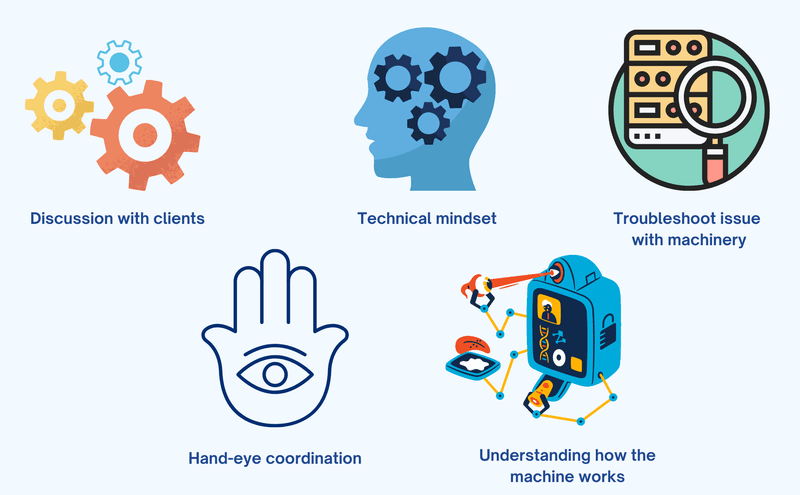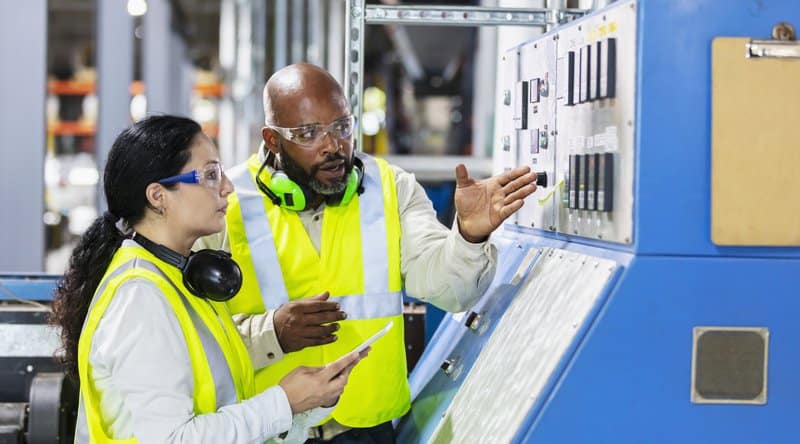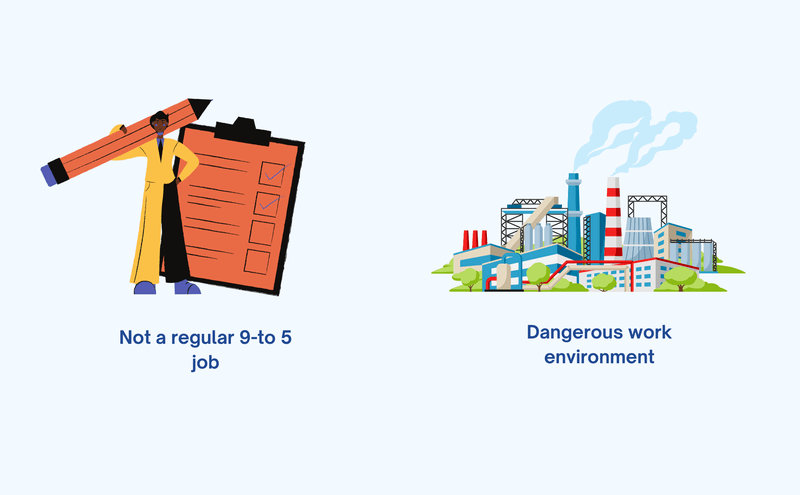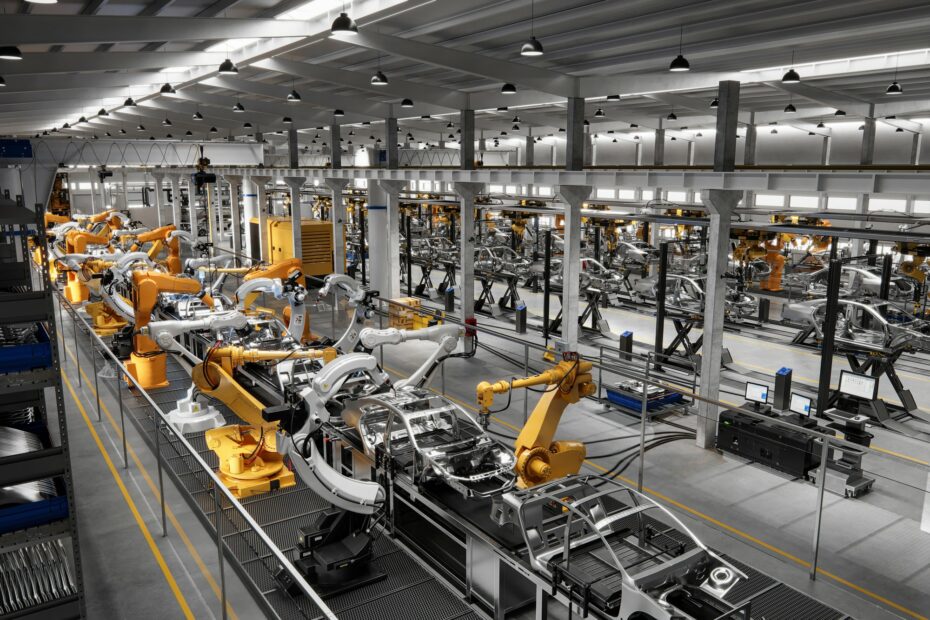Yes, industrial machinery/components is a good career path. It is a fast-growing field with many advantages to those interested in the mechanical engineering, fabrication, and design of industrial machinery.
Choosing the right career is an important decision. This can take weeks, months, or even years as you continue learning what you want and need in a job. So, we at Totempool have come up with a series of articles you can do to help you with the decision-making process. It is important to note that you may have the option to change your path multiple times. This makes the ability to choose a new career a valuable life skill. In this piece, we will answer the question – Is industrial machinery/components a good career path?
What Are the Industrial Machinery/Components?
Industrial machinery components refer to manufacturing machines, devices, or parts. These industries, such as agriculture, automobiles, textile, mining, and construction, are crucial for the economy. They are vital in several sectors.

Also, industrial machinery is a field that helps maintain diverse industries. Moreover, it ensures regular maintenance and repair of the equipment. Some examples of industrial manufacturing include pulleys, gears, bearings, and agricultural bearings.
Several specialized industrial machineries, such as bulldozers, are used to build or demolish buildings. There are liquid fillers, capping machines, rinsing machines, and labelers.
The food packaging industry extensively uses this machinery to package food items such as cereals, candy, sodas, and dried fruit.
Mining equipment assists in the movement of debris. This makes it easier to locate metals and precious stones. Mining also helps find some non-precious stones, such as granite and marble. These metals and stones are then used to create decorative objects along with some items of everyday use.
Also, textile machinery makes yarn and fiber widely used in the clothing and apparel industry.
Is Industrial Machinery/Components A Good Career Path?
Industrial Machinery Components is an exciting and fast-growing career field that can offer many advantages to those interested in the mechanical engineering, fabrication, and design of industrial machinery. It’s a highly sought-after job in today’s economy with high salaries, plenty of room for growth and advancement, and the potential to impact the world. So is Industrial Machinery/Components A Good Career Path? The answer is an emphatic yes!
For starters, the pay for this type of work is incredibly competitive. People with skills in Industrial Machinery Components can expect to earn top dollar for their work. Additionally, numerous job opportunities are available at all levels, from entry-level technicians to experienced engineers. This makes it easy for people to find a position that fits their skill set and experience level.
Skills Needed to Succeed in the Industrial Machinery Career Path

You need soft and specialized skills to succeed in the industrial machinery and components career. These skills include:
Mechanical ability
Using your hands to create something worthwhile is an important skill to succeed in the machinery industry. One must understand how machines work and how they can be repaired if they break down.
Also, one should know how to fix something when it breaks down. He also needs to be able to fix these machines when they break down. He can do this himself or with the help of other employees working under him.
Technical mindset
Understanding how things work and being able to troubleshoot issues with machines are vital in this field. Employees must think like engineers working on creating new technology or improving on old technology to avoid problems within the company or with customers’ machines.
Can troubleshoot issues with the machinery
Proficient reading skills are also needed for this career path because many manuals may need to be read to understand how each machine works and what goes wrong when it does not work correctly.
Commendable hand-eye coordination
This is essential for any job that requires using tools. Especially for those who work with heavy machinery as welders and machinists do daily.
Understanding how the machine works
Basic knowledge of how the machinery operates is also required. This is helpful for people who want an industrial machinery career because it allows them to understand better how certain parts interact with other parts.
Job Opportunities in Industrial Machinery

The various jobs and career options a field provides are critical.
This holds true for industrial machinery as well. The alternatives present go a long way in deciding the answer to the question – Is industrial Machinery A Good Path? So, in this section, we will look at some of the choices available to people who wish to pursue a career in industrial machinery.
Automation Engineers
Engineers in Automation must create, program, and test automated machines or systems performing specific jobs. Machines or robots frequently execute specific automotive and food processing tasks.
Also, automation Engineers have to keep the client informed about their needs and create and connect information between input, controller, output, and monitoring. They also ensure quality standards are followed. Automation engineers typically earn around $90,000 a year.
Quality Control Inspectors
Their main job is to inspect for flaws or deviations from standard processes. They also look for any changes in the industry specifications of various products. This will ensure that your food is not spoilt or your clothes are not easily torn.
Quality control inspectors are also responsible for ensuring all production standards are met. Additionally, they also supervise the quality of all manufactured items. They make around $41,000 a year.
Instrumentation Engineer
Instrumentation engineers help maintain factory machinery. Their job is to perform an analysis of the existing equipment. Also, this will help the machine operators to get the equipment up and running.
Moreover, instrumentation engineers also have to identify potential areas for improvement. Their work also includes developing, installing, and testing new equipment. Instrumentation engineers earn more than $92,000 a year on average.
Research and Development Engineer
Introducing new products based on research on customers’ changing preferences is fundamental. Therefore, the development engineer works on applying research results and developing new technologies. This helps companies advance and keeps them ahead of the competition. Introducing a proven method to keep your firm relevant in changing market dynamics.
Research and development engineers talk to other teams across the organization to help understand product needs better. They also conduct market research studies and analyze the competition’s offerings closely.
This in-depth study and understanding level helps them create prototypes with substantial differences from the competition. Research and Development engineers make around $90,000 per year.
Millwright
Their primary duty is to install, dismantle, assemble, or disassemble machines at power plants, factories, or construction sites. Millwrights must work on taking apart, classifying, and packing every component.
They also work on removing and replacing machine parts that have become defective. Also, it is seen that their job bears a resemblance to that of an industrial mechanic.
Further, millwrights have to read blueprints and schematics. Also, their work involves using tools such as hammers, levers, welders, etc. All this means millwrights must have some working knowledge of mathematics and physics. They earn more than $56000 a year.
Industrial Machinery Mechanics
An industrial machinery mechanic is a very specialized kind of machinist. He typically spends the majority of his time performing maintenance tasks.
Industrial machinery mechanics perform various complicated functions to ensure that the machines under their care continue to work optimally. Also, they have to be familiar with technical manuals. This will help them develop a deep understanding of how the machines work. Then the mechanics can use their knowledge to detect and fix the problem.
They are also involved in fixing the problems that occur during the production process. Industrial machinery mechanics work with a variety of equipment. These include conveyor belts, packaging equipment, and production machinery. Many people in this role also work with hydraulic belts and robotic arms.
Some of their other job responsibilities include – moving heavy machinery from one location to another and cleaning their machines and equipment.
Further, they also ensure that the settings and specifications of the machinery are set to the correct parameters. Finally, they create and maintain records of the tasks that they complete. Industrial machine mechanics make about $56,000 a year.
Calibration Technician
A calibration technician’s job is to ensure the machines are correctly calibrated. This means testing them, doing measurements, and correcting them if they are off. It requires attention to detail, along with familiarity with machines and measures. A calibration technician makes close to $50,000 a year on average.
Logistics Associate
A logistics associate ensures a company has goods where and when needed. He helps distribute, store, inspect, and deliver goods.
Also, a logistics associate is responsible for maintaining records of the various tasks that are carried out. Additionally, he makes sure that all the databases are up to date. Finally, another of his duties is to detect and fix any issues in the supply line and fix them. A logistics associate makes more than $43,000 a year on average.
How Many Jobs Are Available In Industrial Machinery/Components?

The Industrial machinery and components sector is much older when compared to other industries. This translates into several opportunities when choosing a career path in this sector — both in terms of the number of jobs and the type of jobs available.
Also, the best part is that the industrial machinery area is increasing. This means there are lots of new opportunities available at the managerial level as well as at entry-level jobs.
According to the Bureau of Labor Statistics (BLS), the employment of industrial machinery mechanics, machinery maintenance workers, and millwrights is expected to grow 19 percent from 2020 to 2030. This is much more than the average of all other occupations.
Advantages of a Career in Industrial Machinery

When it comes to finding a career, there are many things to consider. One of the most critical aspects of finding the right job is ensuring you will be happy in the long run.
Industrial machinery is an excellent choice for a career because it offers many benefits. Let us look at some benefits of a job in industrial machinery.
Several options with differing educational requirements
There is a job position for every level of education. The educational requirements for a job vary depending on the situation. You can complete your high school or college degree and apply for initial job positions. You also have the choice to complete your bachelor’s or master’s degree to opt for higher positions.
Demand
Job openings are proliferating with the demand for industrial machinery increasing every year. You can also say there are no worries about employment and growth opportunities in the industrial machinery industry.
Opportunities for advancement
Many industrial machinery careers offer opportunities for growth and advancement. Many jobs are entry-level. However, you can find positions that offer more responsibility and pay. If you want to be an expert on industrial machinery, you can become a manufacturing engineer.
Job Security
Industries with many industrial machinery jobs are usually relatively stable and offer good pay and benefits. Also, these jobs are generally union jobs, which can provide better benefits than non-union jobs.
Good pay
Industries that use industrial machinery usually offer good pay. Some industries pay these workers very well. The median annual wage for industrial machinery workers in 2021 was $59,380, according to the Bureau of Labor Statistics (BLS).
Disadvantages of a Career in Industrial Machinery

When finalizing a career path, studying the cons of a particular industry is imperative. Here, we look at some downsides of working in the industrial machinery sector. This will help us better answer the query – Is industrial machinery a good career path?
Not a regular 9-to-5 job
One must know that a career path in industrial machinery is not for everyone. Having a keen interest in and passion for machines is vital to success. This is because working in machines is not a regular 9 to 5 job.
You may be required to put in several shifts on the factory or shop floor during times when there is peak demand. However, things are not as bad as they seem. Once a person reaches senior positions, they can have a more flexible schedule.
Dangerous work environment
It would be clear now that working in the industrial machinery or components sector is not a typical desk job. Most of the time, hard work, challenges, and dangers are involved.
A significant downside to industrial machinery is that it can be a bit of a hazardous field. There’s always the potential for accidents when working with heavy machinery. However, if you’re careful and follow all safety procedures, you’ll be fine.
Global Major Industrial Machinery Manufacturers
Global machinery manufacturers play an essential role in making sure that the world is constantly on the move. The supply of crucial tools helps increase efficiency and reduce costs. This industry comprises industrial, agricultural, mining, and construction machinery.
This section will look at some of the top industrial machinery manufacturers worldwide.
Caterpillar Inc.
Caterpillar Inc. is a United States-based heavy equipment manufacturing company that designs, develops, manufactures, markets, and sells industrial machinery, engines, and financial and insurance products to customers worldwide.
Also, it is the world’s leading manufacturer of construction and mining equipment, diesel and natural gas engines, industrial gas turbines, and diesel-electric locomotives.
Deere & Co.
Deere and Co., operating under the John Deere brand, is an American industrial machinery manufacturing company headquartered in Moline, Illinois, USA. It mainly manufactures agricultural, construction, and forestry machinery, diesel engines (axles, transmissions, gearboxes) used in construction machinery, and lawn care equipment.
CNH Industrial NV
This is a Dutch firm that has its corporate offices in London. It is a global leader that designs, manufactures, and sells construction and agricultural equipment. Also, it makes trucks and other specialty vehicles.
ABB Group
The ABB group is headquartered in Zurich, Switzerland. They are one of the leading industrial equipment manufacturers, electrification products, robotics and motion, industrial automation, and power grids. They have been a part of Fortune 500 companies for the last 25 years.
Linde AG
This German firm is the world’s largest industrial gas company in market share and revenue. Linde is a major supplier of industrial, process, and specialty gases. Its products and services are present in more than 100 companies worldwide.
In Conclusion: Is Industrial Machinery/Components A Good Career Path?
The industrial machinery industry is a fast-paced and growing sector. It is home to many careers and job opportunities for those looking for something challenging, rewarding, and exciting. This is the right place for you if you are unafraid of challenges.
If you want to know more about other career paths, check out this list on Totempool. You can make your choices with solid information before moving to a particular industry.
As more industries are published on the website, we will keep updating the list for you. If you want to learn how to choose your career path, check out this article.

Ranu Kumari is a Professional Writer and a Marketing enthusiast who currently runs her own Marketing Consultancy, LatitudeBOX. She has written promotional articles for multiple brands and has published her work in Scopus indexed journals. She is passionate about expressing her thoughts and ideas to connect with her readers in a voice that they understand.

Thank you for such a great information.
You’re welcome!